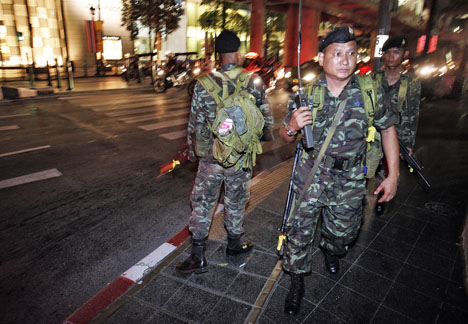Thai military coup overthrows leader

The Associated Press
Sep 20, 2006
Last updated on May 12, 2016 at 04:38 a.m.
BANGKOK, Thailand – In the dead of night and without firing a shot, Thailand’s military overthrew popularly elected Prime Minister Thaksin Shinawatra on Tuesday after mounting criticism that he had undermined democracy.
The sudden, well-orchestrated coup – a throwback to an unsettled era in Thailand – was likely to spark both enthusiasm and criticism at home and abroad. The military said it would soon return power to a democratic government but did not specify when that would occur.
Striking when Thaksin was in New York at the U.N. General Assembly, army commander Gen. Sondhi Boonyaratkalin sent forces into the drizzly, nighttime streets of Bangkok. The military ringed Thaksin’s offices, seized control of television stations and declared a provisional authority loyal to the king.
The coup leaders declared martial law, revoked the constitution and ordered all troops not to leave duty stations without permission from their commanders. The stock exchange was to be closed Wednesday, along with schools, banks and government offices.
Get The Daily Illini in your inbox!
Bangkok’s normally bustling streets emptied out early Wednesday, from shopping stalls to red-light districts, as Thais and tourists learned of the coup.
Across the capital, Thais who trickled out onto barren streets welcomed the surprise turn of events as a necessary climax to months of demands for Thaksin to resign amid allegations of corruption, electoral skullduggery and a worsening Muslim insurgency in the south. Many people were surprised, but few in Bangkok seemed disappointed.
A few dozen people raced over to the prime minister’s office to take pictures of tanks surrounding the area. “This is exciting. Someone had to do this. It’s the right thing,” said Somboon Sukheviriya, 45, software developer snapping pictures of the armored vehicles with his cell phone.
Thaksin recently alienated a segment of the military by claiming senior officers had tried to assassinate him in a failed bombing attempt. He also attempted to remove officers loyal to Sondhi from key positions.
Sondhi, who is known to be close to Thailand’s revered constitutional monarch, will serve as acting prime minister, army spokesman Col. Akarat Chitroj said. Sondhi, well-regarded within the military, is a Muslim in this Buddhist-dominated nation.
Sondhi, 59, was selected last year to head the army partly since it was felt he could better deal with a Muslim insurgency in southern Thailand, where 1,700 people have been killed since 2004. Recently, Sondhi urged negotiations with the separatists in contrast to Thaksin’s hard-fisted approach. Analysts have said that with Thaksin in power, peace in the south was unlikely.
In New York, Thaksin declared an emergency in an audio statement via a state-owned TV station in Bangkok – a vain attempt to stave off the coup. He later canceled a scheduled address to the U.N. General Assembly.
A Foreign Ministry official, who spoke on condition of anonymity, said Thaksin tentatively planned to return to Thailand quickly. The official said he could not comment on the possibility of his being arrested if he were to return to work.
Government spokesman Surapong Suebwonglee, who was with Thaksin, said the coup leaders “cannot succeed” and was confident they would fail “because democracy in Thailand has developed to some…measure of maturity.”
Former Prime Minister Chuan Leekpai, a member of the opposition Democrat Party, reflected an ambivalence that is likely to surface in coming days.
“As politicians, we do not support any kind of coup, but during the past five years the government of Thaksin created several conditions that forced the military to stage the coup. Thaksin has caused the crisis in the country,” he told The Associated Press.
Thaksin, a telecom tycoon turned politician, won three elections since coming to power in 2001 but alienated the urban middle class and intellectuals.





